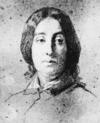- Sand, George
-
orig. Amandine-Aurore-Lucile Dupindied June 8, 1876, NohantFrench writer.During childhood she gained a love of the countryside that would inform most of her works. Married in 1822, she soon tired of her husband, Casimir Dudevant, and began a series of liaisons; her lovers included Prosper Mérimée, Alfred de Musset, and, most importantly, Frédéric Chopin. She became famous (under her pseudonym) with her novel Indiana (1832), a protest against conventions that bind an unhappy wife to her husband. Lélia (1833) extended her iconoclastic views on social and class associations. Similar themes, along with her sympathy for the poor, are evident in her finest works, the so-called rustic novels, including The Devil's Pool (1846), The Country Waif (1848), and Little Fadette (1849).
 George SandBy courtesy of the Musee Carnavalet, Paris
George SandBy courtesy of the Musee Carnavalet, Paris* * *
▪ French novelistpseudonym of Amandine-Aaurore-Lucile (Lucie) Dudevant , née Dupinborn July 1, 1804, Paris, Francedied June 8, 1876, NohantFrench Romantic writer, known primarily for her so-called rustic novels.She was brought up at Nohant, near La Châtre in Berry, the country home of her grandmother. There she gained the profound love and understanding of the countryside that were to inform most of her works. In 1817 she was sent to a convent in Paris, where she acquired a mystical fervour that, though it soon abated, left its mark.In 1822 Aurore married Baron Casimir Dudevant. The first years of the marriage were happy enough, but Aurore soon tired of her well-intentioned but somewhat insensitive husband and sought consolation first in a platonic friendship with a young magistrate and then in a passionate liaison with a neighbour. In January 1831 she left Nohant for Paris, where she found a good friend in Henri de Latouche, the director of Le Figaro, who accepted some of the articles she wrote with Jules Sandeau (Sandeau, Léonard-Sylvain-Julien) under the pseudonym Jules Sand. In 1832 she adopted a new pseudonym, George Sand, for Indiana, a novel in which Sandeau had had no part. This novel, which brought her immediate fame, is a passionate protest against the social conventions that bind a wife to her husband against her will and an apologia for a heroine who abandons an unhappy marriage and finds love. In Valentine (1832) and Lélia (1833) the ideal of free association is extended to the wider sphere of social and class relationships. Valentine is the first of many Sand novels in which the hero is a peasant or a workman.Meanwhile, the list of her lovers was growing; eventually it included, among others, Prosper Mérimée (Mérimée, Prosper), Alfred de Musset (Musset, Alfred de), and Frédéric Chopin (Chopin, Frédéric). She remained impervious to Musset's skeptical views and Chopin's aristocratic prejudices, while the man whose opinions she adopted wholeheartedly, the philosopher Pierre Lerous, was never her lover. The fact remains, however, that most of her early works, including Lélia, Mauprat (1837), Spiridion (1839), and Les sept Cordes de la lyre (1840), show the influence of one or another of the men with whom she associated.Eventually, she found her true form in her rustic novels, which drew their chief inspiration from her lifelong love of the countryside and sympathy for the poor. In La Mare au diable (1846), François le Champi (1848), and La Petite Fadette (1849), the familiar theme of George Sand's work—love transcending the obstacles of convention and class—in the familiar setting of the Berry countryside, regained pride of place. These rustic tales are probably her finest works. She subsequently produced a series of novels and plays of impeccable morality and conservatism. Among her later works are the autobiography Histoire de ma vie (1854–55; “Story of My Life”) and Contes d'une grand'mère (1873; “Tales of a Grandmother”), a collection of stories she wrote for her grandchildren.Additional ReadingAmong the many biographical studies are André Maurois, Lélia: The Life of George Sand (1953; reprinted 1977); Ruth Jordan, George Sand (1976); Renee Winegarten, The Double Life of George Sand, Woman and Writer (1978); Belinda Jack, George Sand: A Woman's Life Writ Large (1999); Elizabeth Harlan, George Sand (2004); and Benita Eisler, Naked in the Marketplace: The Lives of George Sand (2006).* * *
Universalium. 2010.
